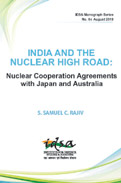India and the Nuclear High Road: Nuclear Cooperation Agreements with Japan and Australia
- 2019 |
- Monograph
Apart from the United States, India’s nuclear cooperation agreements with Japan and Australia have been the most contentious domestically within those countries. The ‘slow embrace’ of India’s civil nuclear credentials by Japan — given the four years for negotiations to begin (after the December 2006 Joint Statement which talked about discussions regarding such an agreement with India) in addition to the six years it took for negotiations to bear fruit — took place despite the strategic context of increasingly closer economic, political, and security ties. While it took fewer than two years from the commencement of negotiations to the signing of the agreement — as against six years in the case of the India-Japan NCA — the process that led to the signing of the India-Australia NCA was contentious. Having successfully overcome such hurdles on the nuclear high road, India is now finally on the cusp of realising its much-delayed nuclear power targets.
About the Author
S. Samuel C. Rajiv is Associate Fellow at the Institute for Defence Studies and Analyses (IDSA). He has published on issues related to India’s foreign and security policies in Strategic Analysis, Foreign Policy, The Cipher Brief, Business Standard, Jerusalem Post, The Organiser, among others. Rajiv’s peer-reviewed articles, ‘In Pursuit of a Chimera: Nuclear Imbroglio between Sanctions and Engagement’ (Strategic Analysis, November 2012), ‘Politicised Safeguards: Iran-IAEA Contentions, Drivers, Policy Implications’ (Strategic Analysis, September 2014) and ‘Israel-China Ties at 25: The Limited Partnership’ (Strategic Analysis, July 2017) were judged the best articles published during the year in a refereed journal by independent juries and awarded the IDSA President’s Award for Excellence for 2013, 2014 and 2017 respectively. Rajiv was also the Co-Editor of the July-August 2017 Special Issue of Strategic Analysis on ‘India-Israel Relations at 25’.
Keywords: India, Nuclear, Nuclear Energy






